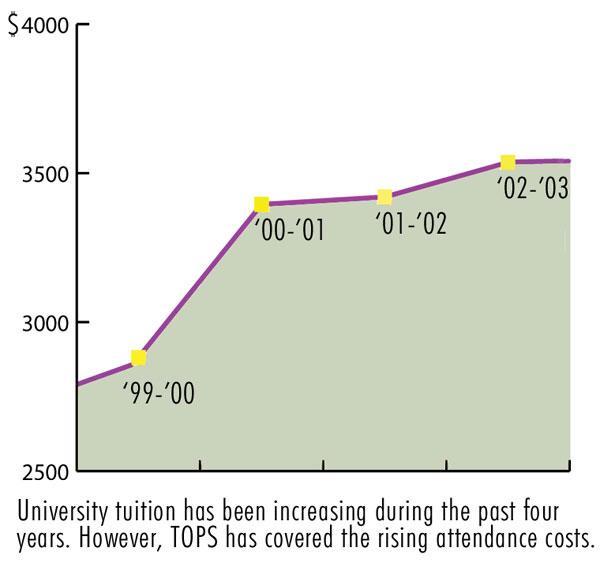The LSU Board of Supervisors recently approved a 3 percent tuition increase for the second consecutive year, and the University plans to use the money to hire more faculty members and add more courses, said Robert Kuhn, associate vice chancellor for budget and planning.
The joint Legislature wrote a constitutional amendment allowing the Board of Supervisors to increase tuition and mandatory fees for resident students up to 3 percent annually until July 2005.
When the Legislature approved the proposal to increase tuition and fees, it also agreed to equally increase the TOPS scholarship award. Students who receive TOPS will not pay any more for tuition next year.
The amendment also grants permission for Student Government to increase student fees for services, activities and certain organizations.
The University has the lowest state appropriations per student and average tuition prices compared to schools in the same category. The Southern Regional Education Boards categorized educational institutions based on degree numbers, types and distribution and program offerings.
LSU is categorized as a Four-Year 1 university for awarding at least 100 doctoral degrees in diverse categories. Twenty-nine universities hold the title, including fellow SEC schools University of Florida, Mississippi State, Auburn and University of Kentucky.
Kuhn said the Board of Regents admitted the state grossly underfinances the University. According to a chart made by the Regents, the University receives only 65 percent of the appropriations it needs.
The University lags behind comparative schools’ state funding by nearly $90 million dollars.
LSU’s current annual tuition price is $3,536, close to the Four-Year 1 median of $3,867. The highest tuition price is at Clemson University at $5,834 and the lowest at University of Florida at $2,581.
However, the University is not alone in the tuition-raising dilemma. Clemson had to raise its tuition by more than 40 percent to offset the school’s significant reduction in state appropriations, according to an article in the Chronicle of Higher Education.
The Office of Budget and Planning allows individual University departments to decide how they will use their appropriations.
Students have mixed reactions about the increase because many students would like more faculty but do not want to pay more out of pocket.
“If there is an increase, students should get the benefit,” said Vishnu Budda, a graduate student in computer science.
He said while many fees have increased, he has not noticed an improvement in his education or college experience. He also recognizes the need for increased faculty numbers and diversity but said he feels the state should invest more into the University.
Budda also said the state should prioritize funding for University improvement for the good of Baton Rouge and Louisiana as a whole.
“Even though most students won’t notice it because of TOPS, it would be nice for our tax money to go for higher education,” said Adam Foreman, an English senior. “I think [the increase] will really affect students who do not have TOPS. Ten dollars here and $30 there really adds up to several hundred dollars, making it hard for students to come to school.”
Foreman said the University could use more faculty for higher course diversity and availability. Budda agrees but said he believes the burden should fall on the state, not students.
“Since most students have TOPS scholarships, the few of us outsiders are treated unfairly,” Budda said. “I’ve been paying my tuition for the last three semesters. Every increase is a big burden for me. Many students move to other universities because they can’t afford it here.”
Despite the lack of funding, Kuhn said the University still is in the same league as comparable institutions.
“It’s amazing LSU accomplished so much even with underfunding,” he said.
Climbing Costs
December 3, 2002

Climbing Costs




